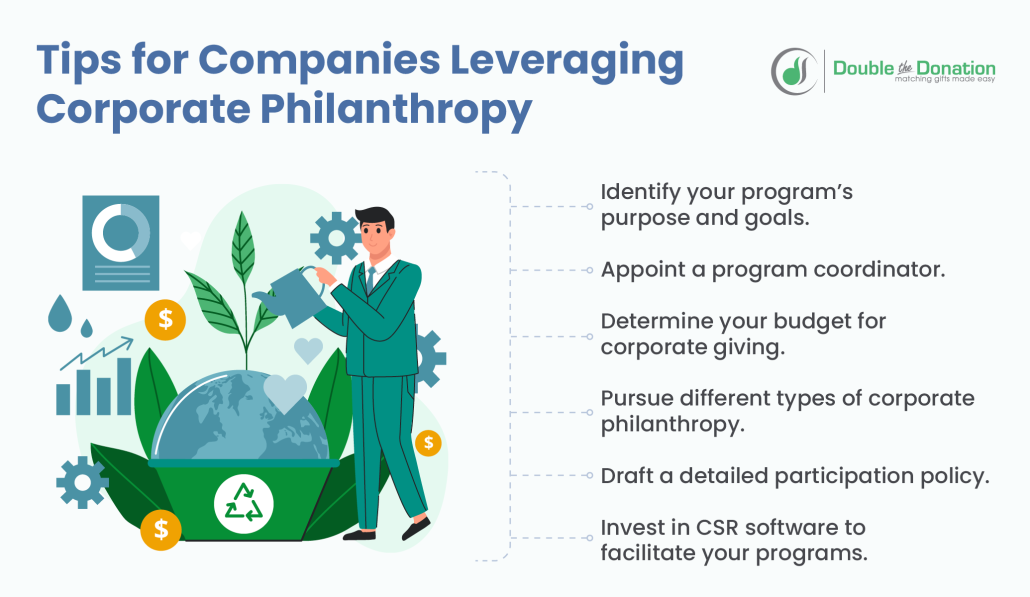Corporate philanthropy and climate resilience: Building stronger communities
The Duty of Corporate Philanthropy in Fostering Sustainable Company Practices
Company philanthropy has actually become a critical method for companies intending to incorporate sustainability right into their procedures. By lining up business objectives with social and ecological campaigns, companies can foster much healthier ecological communities. This technique not only improves business online reputation however also strengthens stakeholder connections. Nevertheless, real degree of its effect on long-term organization success continues to be to be explored. What ingenious methods are being embraced because of this?
Recognizing Corporate Philanthropy and Its Significance
Company philanthropy functions as an essential system where services can contribute to social wellness while enhancing their very own reputations. This technique includes companies assigning sources, such as funds, time, or experience, to sustain area campaigns, philanthropic reasons, or social programs. By engaging in kind initiatives, companies can resolve pushing social issues, such as education and learning, wellness treatment, and ecological issues, consequently playing a pivotal role in cultivating favorable adjustment.
Moreover, company philanthropy can improve staff member spirits and draw in talent, as individuals increasingly seek to help socially accountable companies. It can also strengthen client commitment, as customers choose brand names that demonstrate a commitment to making a difference. Ultimately, understanding the significance of corporate philanthropy lies in recognizing its twin benefits: enriching neighborhood well-being while simultaneously enhancing business trustworthiness and reliability in the eyes of stakeholders. This placement of social duty with industrial rate of interests emphasizes its importance in today's company landscape.
The Connection Between Corporate Philanthropy and Sustainability
While numerous companies participate in philanthropy to boost their public photo, a much deeper link exists between corporate philanthropy and sustainability. Corporate philanthropy typically lines up with sustainable methods by sustaining initiatives that attend to social and ecological obstacles. When businesses purchase neighborhood jobs, renewable resource, or instructional programs, they add to a much healthier ecological community and culture. This commitment not only fosters goodwill but additionally reinforces stakeholder partnerships, boosting brand name loyalty.

Situation Studies: Effective Business Philanthropy Initiatives
Numerous firms have successfully incorporated humanitarian initiatives right into their company strategies, showing the tangible advantages of such commitments. Microsoft has released numerous programs, such as its AI for Planet initiative, which sustains environmental sustainability with technology. This strategy not just help conservation efforts yet likewise boosts Microsoft's credibility as a leader in company responsibility.
In a similar way, Unilever's Sustainable Living Strategy stresses social and environmental impact, aligning its philanthropy with organization objectives. By funding tasks that boost hygiene and cleanliness, Unilever enhances its brand name while adding to worldwide wellness.
An additional noteworthy example is Patagonia, which promises 1% of sales to ecological reasons. This commitment resonates with consumers, promoting commitment and driving sales.
These study highlight that efficient business philanthropy can produce economic returns while promoting sustainable practices, strengthening the idea that honest service techniques are advantageous for both society and profits.
Building Stronger Stakeholder Relationships Via Philanthropy
Philanthropy acts as an important tool for business seeking to enhance their connections with stakeholders, as it promotes depend on and shows a dedication to social obligation. By engaging in charitable efforts, companies can link with regional neighborhoods, enhancing their credibility and encouraging stakeholder loyalty. This engagement often leads to meaningful communications, developing a more helpful hints feeling of shared values between the firm and its stakeholders.
Philanthropic efforts can address details neighborhood demands, enabling organizations to contribute positively to social challenges. This participation not only showcases a business's moral stance yet likewise helps in bring in and retaining consumers that focus on social responsibility.
In addition, workers often feel extra motivated and involved when they see their organization actively joining philanthropic tasks, resulting in an extra productive workplace culture. Subsequently, company philanthropy ends up being a strategic method for developing stronger, a lot more durable partnerships with diverse stakeholder groups.
Gauging the Influence of Company Philanthropy on Business Success
The connection between business philanthropy and stakeholder engagement establishes the stage for examining its effect on general organization success. Organizations often determine this influence with numerous metrics, including brand name credibility, worker fulfillment, and customer loyalty. Philanthropic efforts can enhance a company's photo, promoting count on among customers and investors alike. Involved workers have a tendency to show higher morale and productivity, directly correlating to improved business performance.
Measurable analysis can additionally be used, with organizations assessing financial returns versus humanitarian expenditures. Research study indicates that business with solid humanitarian dedications often experience higher supply performance and reduced volatility. In addition, qualitative analyses, such as stakeholder responses, can offer understandings into area perceptions and long-lasting relational benefits.
Inevitably, measuring the influence of business philanthropy calls for a diverse method, integrating both qualitative and quantitative information to guarantee a detailed understanding of its influence on organization success. corporate philanthropy.
Regularly Asked Questions
How Can Small Companies Involve in Business Philanthropy Efficiently?

What Are Common False Impressions Regarding Corporate Philanthropy?

Exactly How Does Corporate Philanthropy Impact Worker Morale?
Company philanthropy positively affects worker morale by cultivating a sense of objective, improving job contentment, and promoting loyalty. Workers frequently really feel a lot more engaged and inspired when their company adds to social causes, developing a supportive workplace.
What Are the Tax Obligation Benefits of Company Philanthropy for Companies?
Company philanthropy uses significant tax obligation benefits for services, including deductions on philanthropic contributions and possible reductions in taxed income. These rewards urge companies to involve in social campaigns while simultaneously boosting their financial standing.
How Can Companies Select Reliable Philanthropic Partners?
Business can pick effective humanitarian companions by evaluating alignment with their worths, determining impact capacity, view publisher site checking out financial transparency, and promoting solid interaction. This strategic technique boosts collaboration and guarantees shared advantages for both events entailed.
Corporate philanthropy serves as a necessary device through which companies can add to social health while boosting their very own credibilities - corporate philanthropy. Eventually, comprehending the value of company philanthropy exists in recognizing its dual benefits: enriching community welfare while at the same time improving service integrity and reliability in the eyes of stakeholders. While several companies involve in philanthropy to enhance their public image, a deeper connection exists between corporate philanthropy and sustainability. The connection between corporate philanthropy and stakeholder engagement sets go to my blog the stage for assessing its effect on general organization success. Business philanthropy offers substantial tax obligation advantages for companies, including reductions on philanthropic payments and potential decreases in taxed earnings